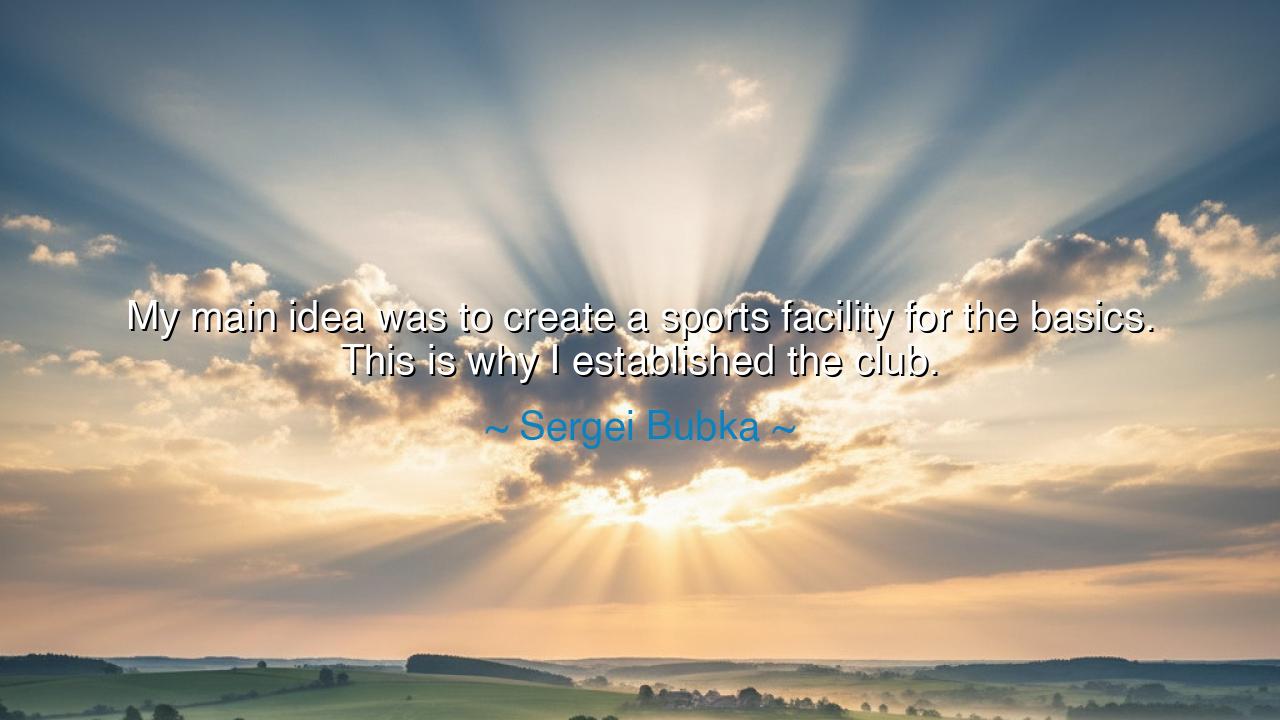
My main idea was to create a sports facility for the basics.
My main idea was to create a sports facility for the basics. This is why I established the club.






The words of Sergei Bubka, the soaring pole vaulter who once touched the heavens, descend to us with simplicity yet with the weight of eternal wisdom: “My main idea was to create a sports facility for the basics. This is why I established the club.” Though brief, this saying speaks not only of athletics, but of the foundation upon which all greatness is built: the basics, the roots, the humble beginnings from which every tower of triumph must rise.
The ancients taught that no man becomes mighty without first mastering the small things. The swordsman begins with the stance; the orator begins with the breath; the builder begins with the stone. Bubka, who soared higher than any before him, did not forget this truth. He knew that a temple of sport is not built for the elite alone, but for the young, the untrained, those who must first learn to walk before they can run, to run before they can leap. In establishing his club, he gave to others not glory, but the tools by which glory might one day be won.
Consider the tale of the Academy of Plato. Though it became the wellspring of philosophy, it began with simple conversations under the olive trees. Plato did not seek to create geniuses overnight, but to provide a place where young minds could grasp the basics of questioning, reasoning, and seeking truth. From that humble beginning came ideas that have shaped civilizations. So too with Bubka: his sports facility was not for the dazzling spectacle, but for the daily grind of learning, training, repeating—the basics that forge champions.
In Bubka’s words we hear also the voice of humility. A man who held the world record in pole vault for decades could have built monuments to his own name, but instead he chose to build a place for others. This reflects the wisdom of the elders, who, upon reaching the heights of their own journey, turn back to lift others. The true legacy of greatness is not in medals or titles, but in planting seeds for those who follow. The club was his gift to the future, a sanctuary where discipline and hope could take root.
The meaning reaches beyond athletics. In life, in art, in work, we are too easily tempted to leap ahead, to chase the extraordinary without mastering the ordinary. But the path of endurance belongs to those who return to the basics, who sharpen their foundations again and again. The farmer who tends his soil each season, the musician who plays scales until his fingers bleed, the student who studies patiently—these are the ones who rise when others fall. Bubka’s vision calls us back to the discipline of simplicity, for it is in the small things that greatness hides.
The lesson for us is clear: build your life not upon fleeting desires, but upon strong foundations. Create for yourself a facility of the soul, a daily practice of basics—whether in your craft, your faith, or your relationships. And when you reach your own heights, do not hoard them. Establish your own club, in whatever form it may take: mentor the young, teach the beginner, share your knowledge. For true greatness is not only to rise high, but to help others rise with you.
So let the wisdom of Bubka endure: honor the basics, for they are the roots of all achievement. Build spaces—whether literal or spiritual—where others may train, learn, and grow. And remember always that legacy is not measured by how high you fly, but by how many you teach to take off.
For in the end, the champion is not only the one who clears the bar, but the one who plants the pole firmly in the ground, so that others, too, may one day vault into the sky.






AAdministratorAdministrator
Welcome, honored guests. Please leave a comment, we will respond soon